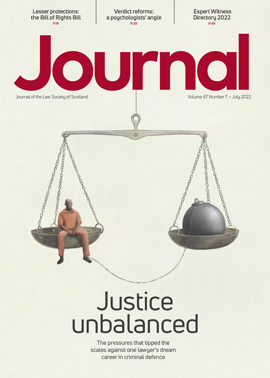Dreams to dust
 “Criminal defence is all I ever wanted to do… But my mental health now is the lowest it’s ever been… I genuinely feel exhausted.”
“Criminal defence is all I ever wanted to do… But my mental health now is the lowest it’s ever been… I genuinely feel exhausted.”
The speaker is Lyndsey Barber, who just nine years ago undertook an epic tour of Scotland to seek the criminal defence traineeship that would open the door to her dream job. Now, worn down by low pay on legal aid and a malfunctioning court system, she is packing it in for something different. She told the Journal the story of how the dream turned sour.
Readers may have heard some of it, through a (latterly tearful) video she posted to LinkedIn, and available on YouTube, to announce her departure. In it, she describes life at the defence bar today as “soul-destroying… It takes all my energy every day to open a courtroom door”.
How then have we come to this point, for the determined young woman who from the time she started high school wanted to be a defence lawyer, who drove 1,800 miles crisscrossing the country from Wick to Wigtown visiting 85 different firms hoping to be offered a traineeship, and who after different qualified posts, claims she has “really enjoyed” in particular the combination of defence and children’s hearings work that her present position provides?
Beyond breaking point
The doubts as to whether she could carry on, Barber tells me, began when she was newly married and applying for a mortgage and other finance, which she found a difficult experience on her earnings. Since then, she has discovered, “When I speak to people who aren’t lawyers about what we get paid, every single one of them is surprised that it’s not representative of the work we do.”
The work began to lose its shine. “When you factor in everything else that goes with the job, you’ll be on call, the callouts, the constant client messages on various platforms at all times of day or night, it was draining. I enjoyed the job but it was constantly overshadowed by worrying about bills and waiting for expenses to be paid and everything else. It just wasn’t a pattern I could see the profession coming out of, and financially and emotionally it was taking its toll.”
Then came the pandemic, which added to the pressures on mental health. “Very few defence lawyers were furloughed or took time off, and it was apparent that everybody was vulnerable, everybody was in an unknown situation, and there isn’t the support that defence practitioners need. It was making me feel more vulnerable when I was already not feeling great about things. There’s a lot more support, a lot more staff at the other side of the table and that’s not a luxury that the defence have.”
Post-COVID, with the pressure on the courts to reduce the case backlog, there is no longer the same allowance for the problems facing defence agents. “The courts are trying to get business as normal; if we’re asking for adjournments because we physically don’t have the capacity to do the cases, the frustrations from the sheriffs are aimed at the defence.”
Some sheriffs in particular, Barber claims, know the pressures on the defence but tend to disregard them.
“The majority of criminal lawyers are never happier than when they’re in court doing a trial, but at the moment more often than not cases are having to go off because someone is in a jury trial and the trainee can’t appear in court or any number of reasons, and even sheriffs that know our firm well – and it has a good reputation – are not entirely sympathetic to the pressures of the defence and how it is at the moment.”
If the system worked better, would she still be coping, with or without fee increases? “No. Absolutely not. The money is absolutely scandalous for what we do. I’ve seen somebody work out recently that it’s just about minimum wage for a summary fixed fee, and that’s whether the case is resolved immediately or at the end of matters. There’s literally no money left in it. It’s just beyond broken.”
“People would walk”
What about the effects on her personally? “My mental health is the lowest it’s ever been, because I find that the sheriff’s attitude can have a massive impact on our day. If you know you’re going to be at court with somebody who’s going to give you a hard time for something that’s unavoidable, it makes it so much harder when we’ve got constant pressure from clients as well.
“I’m not aware of having had mental health problems before. But now I genuinely feel exhausted, and the sad thing is I know there is an endemic problem in the profession now, of mental health and exhaustion and people who would walk away if they had another option. A lot of people.”
It affects her family life, “because you can’t switch off. It’s not a 9 to 5 job and I don’t think anybody entered the profession thinking it would be, but we don’t have a support network and you can be on call or you get messages from clients in the middle of the night. You can put your phone on silent but you’re constantly on edge just waiting for the ball to be dropped”.
Likewise for her colleagues. “Everybody is just exhausted. People are worn down; you can see a physical difference in people when there’s a certain sheriff on the bench. And that’s horrible. Everybody is wanting to do their job so they can pay their bills or go on holiday or whatever, and when you consider how thankless it is to do this job you have to wonder how the profession survives.”
Clients losing out
The video claims that the defence bar no longer has the capacity to service the workload. What does that mean in practical terms for clients or people seeking help?
“They’re not getting the level of service they should be or that perhaps they would have got previously, because there are a number of additional procedures now for both summary and solemn cases that require extra work and preparation and an expectation that that will be done, but no extra money for it to bring in more trainees, more admin staff, more support staff. There shouldn’t be any disparity or difference in how people approach a private case or a legal aid case; they should all be treated with the same merit and the same attention to detail, but we are not getting the time to look at cases for the next day or to prep things. I feel that a lot of us are just flying by the seat of our pants because we’re just not getting the time to look at things.”
Are would-be clients actually being turned away? “Yes, a lot of the time they are now. And that’s unheard of.”
A world away
Barber is off to do something completely different. Had she considered following many of her peers into the prosecution service, or focusing on her other love, child law? Maybe if she was starting her career now. “It is literally a no-brainer to me that if I was starting out again, as much as I’ve never ever wanted to prosecute, if I was at the trainee or NQ stage and I was going to get 15 or 20 grand extra for doing the same job with more support, and more perks across the table, that wouldn’t even be a decision for me – I literally couldn’t get the application form done quickly enough.”
But it doesn’t interest her now. “I know myself as a person as well – it just wouldn’t be a good fit for me, though the money would be a massive temptation. Children, I could have done that full time, but even that is financially very punitive, and I think as well it’s good for me as a lawyer to have the two disciplines – it gives you a break and a different focus as opposed to just doing children, especially as some of the subject matter is quite harrowing. I would struggle with doing that full time.”
Instead, she is returning to a commercial firm in Geneva, where she spent some time pre-traineeship, but now working remotely. Strikingly different, it’s the world of high net worth investors and hedge fund managers, of IPOs and due diligence on companies that are going public. Does it hold an appeal? “It’s very different; it’s very gruelling; it obviously has its own pressures, but it’s a completely different world from what I’m doing now. It was very glossy and fancy, but it’s still law and I’m very grateful to have the opportunity.”
Not that she will be confined to a desk in her spare room. “No, I would struggle after being out and about so much! And I like people, I like interacting, and I have a lot of freedom to manage that. I can travel if I want. There’s an office in Geneva and one in Wall Street, so I’m hoping to get a bit of travel in.”
None of her colleagues grudges her the move. “I’ve been quite overwhelmed by the support. Everybody at various levels has been so approachable and quite emotional, particularly some older male lawyers with whom I’ve only really ever had maybe a cursory conversation, coming out of their way to say that they’re grateful for the video, and sad at the same time.” Absolutely no one has told her things will get better, or begged her to stay and rethink.
Of course, she is sad to be leaving her chosen career. “I am quite emotional about it, but for me, it’s not manageable any more.”
Will Barber’s high profile departure have an impact? Her video concludes: “I’m being outspoken because I don’t want anybody else to feel this way. What I hope comes out of this is at least that the people who can amend this, who can change it and make it better, do so. Because we deserve so much better.”
Perspectives
Features
Briefings
- Civil court: Issues on appeal
- Licensing: Minimum pricing – a genuine impact?
- Insolvency: How to admit joint creditor claims
- Tax: windfall and plastic packaging taxes raise stakes
- Immigration: Asylum system overhauled
- Scottish Solicitors' Discipline Tribunal: July 2022
- In-house: In with the stonework
- Property: Living with the Register of Overseas Entities
In practice
- OPG update: July 2022
- Public policy highlights: July 2022
- Gear up for the Scottish Legal Walks
- Disabled solicitor support group proposed
- Risk: Cybercrime – the hybrid worker prey
- Ask Ash: Piling it on
- TRS: time for a trusts trawl
- Know people, know business
- High street and hybrid
- Appreciation: Ian Leslie Shaw Balfour
- The Expert Witness Directory 2022
- Expert witness: case law update







